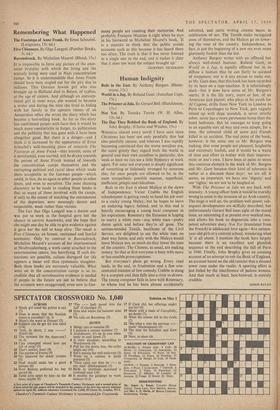Remembering What Happened
The Footsteps of Anne Frank. By Ernst Schnabel. (Longmans, 1.3s. 6d.)
Ravensbruck. By Micheline Maurel. (Blond, 15s.)
IT is impossible to form any picture of the enor- mous brutality with which the living and the scarcely living were used in Nazi concentration camps. So it is understandable that Anne Frank should have been singled out for the pity due to millions. This German Jewish girl who was brought up in Holland died in Belsen, of typhus, at the age of sixteen. And although an unexcep- tional girl in most ways, she wanted to become a writer and during the time she lived in hiding with her family in the upstairs rooms of an Amsterdam office she wrote the diary which has become a best-selling book. As far as this diary has confronted' people with facts that it would be much more comfortable to forget, its publication and the publicity that has gone with it have been altogether good. But there is a danger—and I think it is increased by the appearance of Ernst. Schnabel's well-meaning piece of research The Footsteps of Anne Frank—that interest, some of it sentimental, even morbid, will be drawn towards the person of Anne Frank instead of towards the concentration camps themselves and the corrupting political and racial ideas which made them acceptable to the German people—which could, in fact, do so again to other people at other times, and even to ourselves. The most shaming discovery/ to be made in reading these books is that so many of those involved with the camps, if only to the extent of watching the entrainment of the deportees, • were seemingly decent and respectable, weak rather than vicious.
The fact that Olga Lengyel was a doctor and was put to work in the hospital gave her the chance to survive Auschwitz, and the hope that she might one day be able to give evidence against it gave her the will to keep alive. The result is Five Chimneys, an honest, restrained and fearful testimony. Only by contrast is Ravensbruck, Micheline Maurel's account of her imprisonment at Neubrandenburg, a work camp attached to the extermination centre, less horrifying. If such dis- tinctions are possible, callous disregard for life appears a lesser evil than systematic slaughter. Both these books are extremely valuable. What went on in the concentration camps is so in- credible that all corroborative evidence is needed if people in the future are not to believe that the accounts were exaggerated; even now in Ger-
many people are resisting their memories. And probably Francois Mauriac is right when he says in his foreword to Micheline Maurel's book, 'It is a mistake to think that the public avoids accounts such as this because it has heard them too often. The truth is that it has never listened to a single one to the end, and it makes it clear that it does not want the subject brought up.'
GEOFFREY NICHOLSON


































 Previous page
Previous page